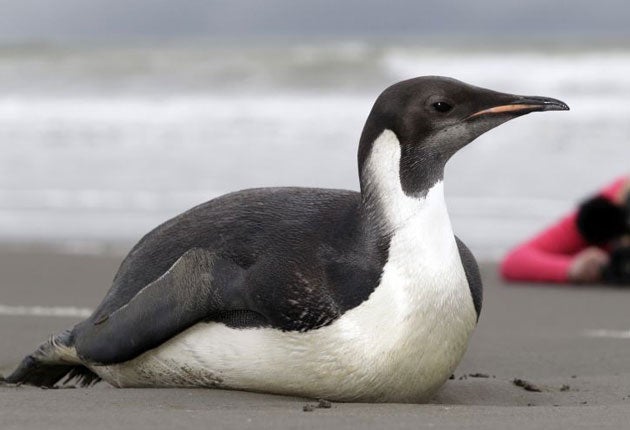Your support helps us to tell the story
From reproductive rights to climate change to Big Tech, The Independent is on the ground when the story is developing. Whether it's investigating the financials of Elon Musk's pro-Trump PAC or producing our latest documentary, 'The A Word', which shines a light on the American women fighting for reproductive rights, we know how important it is to parse out the facts from the messaging.
At such a critical moment in US history, we need reporters on the ground. Your donation allows us to keep sending journalists to speak to both sides of the story.
The Independent is trusted by Americans across the entire political spectrum. And unlike many other quality news outlets, we choose not to lock Americans out of our reporting and analysis with paywalls. We believe quality journalism should be available to everyone, paid for by those who can afford it.
Your support makes all the difference.There will be no lift back to Antarctica for a young penguin who defied the odds by swimming all the way to New Zealand.
Wildlife officials said today that they will let "nature take its course" after the Emperor penguin ended up on picturesque Peka Peka Beach on North Island - 2,000 miles (3,200km) from Antarctic waters - in the country's first sighting of the bird in the wild in 44 years.
The penguin could have caught a disease by swimming through warmer climes, and officials would not want to be responsible for introducing illnesses into the insulated Antarctic penguin colony, said Peter Simpson, of New Zealand's Department of Conservation.
Then there are the logistics.
It is currently dark almost 24 hours a day in Antarctica and virtually no-one travels there this time of year, Mr Simpson said. Even if they did, there would be no simple way to transport and cool a bird which stands almost three 3ft (1m) tall and is well insulated with fat.
Wildlife officials said the penguin has been eating wet sand, probably mistaking it for snow, and Mr Simpson said its plight has sparked entreaties from around the world asking New Zealand to help it get home since it was spotted by a resident on Monday.
"We are going to let nature take its course," he said. "It roamed here naturally. What is wrong with that?"
Mr Simpson said he hopes the penguin will find its own way back - particularly as it starts to become hungry. It appears healthy and well fed, he added, and may not need another meal for several weeks.
The unusual bird attracted all sorts of attention at the beach today. School groups visited, television crews took footage, and onlookers snapped photos and even sketched it.
The penguin has been resting on the sand throughout the day but has apparently been taking to the water at night, Mr Simpson said.
Experts do not know if the bird is a male or female - because the two sexes are almost indistinguishable among Emperor penguins.
The tallest and largest species of penguin, Emperors typically spend their entire lives in Antarctica. Their amazing journey to breeding grounds deep in the Antarctic was chronicled in the 2005 documentary March Of The Penguins, which highlighted their ability to survive - and breed - despite the region's brutal winter.
Christine Wilton was walking her dog on Monday when she came across the bird and called conservation authorities. She said it seemed a little more lethargic today than earlier in the week but was still alert and appeared unfazed by all the attention.
"It looks really grand when it stands up," she said. "I hope it stays safe, I really do, because it is just too precious."
Estimated to be about 10 months old, the penguin probably was born during the last Antarctic winter and may have been searching for squid and krill when it got lost, experts said.
Emperors can grow up to 4ft (122cm) tall and weigh more than 75lb (34kg). They can spend months at a time in the ocean. It is unclear how this one became disoriented, but it probably came ashore for a rest, said Colin Miskelly, a curator at Te Papa, the Museum of New Zealand.
It needs to find its way south to cooler waters if it is to survive. He said Emperor penguins can drink salt water, but eat snow in the winter to hydrate themselves.
The last confirmed sighting of a wild Emperor in New Zealand was in 1967 at the southern Oreti Beach, Mr Simpson said.

Join our commenting forum
Join thought-provoking conversations, follow other Independent readers and see their replies
Comments